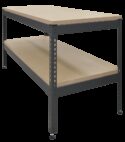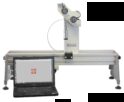Experimento
STS6

Torsion of Circular Sections (Next Generation Structures)
Experiment for the study of torque and defl ection in diff erent materials with circular section. Mounts on the Structures platform and connects to the Structures automatic data acquisition unit and software.
If you have any questions or you'd like to discuss a product, please call us.
+44 1159 722 611Torsion of Circular Sections (Next Generation Structures)
One of a range of experiment modules that fit to the Structures platform (STS1, available separately), this product helps students to understand the torsional elastic properties of circular sections (tubes and solid rods). Students choose from a selection of test rods and fit them between two collet ‘chucks’. They may adjust the distance between the chucks for tests on varying rod length. Each chuck includes pointers that work with the scale on the platform for accurate positioning.
Students apply angular deflection to the specimen using a chuck which includes a precision potentiometer to measure the angular defl ection. The other chuck connects to a load cell to measure the resulting torque. Students use textbook beam equations to predict the deflection and torque relationship and compare the calculated results with the measured results. This helps confirm the reliability of the textbook equations and the accuracy of the experiment results.
This product includes a set of rods of different metals and a tube for comparison of the elastic properties, dimensions and polar second moment of area (‘J’ value). It also allows the student to vary the eff ective length of the rods to see how this aff ects the magnitude of deflection for a given torque.
The potentiometer and load cell connect to the USB interface hub of the Structures platform for computer display and data acquisition.
Learning outcomes
- Torsion formula
- Rod length and angle of twist relationship
- Rod material and angular defl ection—the elastic (shear) modulus (G)
- Rod cross-sectional dimensions and torsion—the polar second moment of area (J)
- Comparison of angular defl ection in similar hollow and solid rods
- Mass per unit length and torsional resistance efficiency of tubes compared to solid rods









